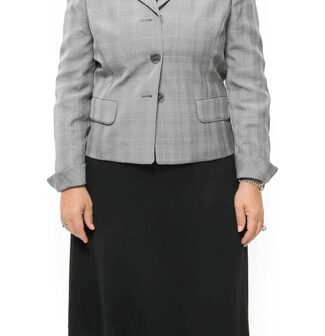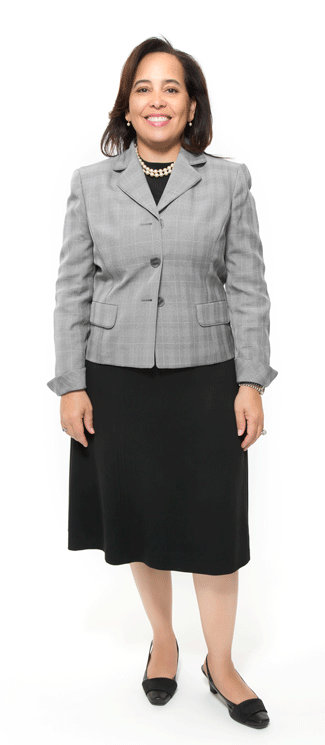
It was nice. The swearing-in ceremony—let me get the right words. It hit the right chord. People were happy for me, so it was celebratory. But it was still a respectful, solemn occasion [her predecessor, Mike McLelland, was gunned down, along with his wife, at their house]. Justice Carolyn Wright, the chief justice of the Fifth Court of Appeals, did the swearing in. It was sort of awesome, just the idea of these two African-American women. People tell me I’m the first African-American woman who’s a D.A. in Texas. Who knew?
When you were appointed, did Governor Perry call you? How does that happen?
Governor Perry does not call people. He has an appointment staff. You have to apply. Okay, I’ve talked to my family. I’ll step forward. Because there was some fear. “Is it the Aryan Brotherhood? Are you really a nut? You are African-American. Is this really what you want to do?” After talking to my husband, we said, “We are all in this together. We’re all in the same amount of risk. If there’s a list, you’re already on it. You’re qualified. You were an assistant district attorney for 14 years. You’re a judge. We need someone from the community who can unite all of us again.” That was the thinking.
When you took the position, we still didn’t know who’d killed the McLellands in March and prosecutor Mark Hasse in January. The Morning News wrote a lot suggesting that the Aryan Brotherhood did it. I read that you were wearing a bulletproof vest. Now that it looks like you’ve got the folks responsible in custody [a disgruntled former justice of the peace and his wife], do you take off the bulletproof vest?
[chuckles] Let me say this. I received a bulletproof vest. We were running high. But I did not wear it. I said, “I’m not looking that fat.” Seriously. I brought it home. So it’s true if someone said they saw me with it. And brought it back in a bag. I said, “We’re going to be fine.” This is really graphic, but you know that Mark was shot in the carotid artery. A bulletproof vest isn’t going to matter if they’re across the street and going to take a head shot at you. Once I calmed down, I really never put the thing on. I thought, “I ain’t looking 10 pounds heavier. I’ll just die looking thinner.”
You’re the third black D.A. in Texas.
I don’t know that. I knew Craig [Watkins, in Dallas] was the first.
Well, I’ve seen third and second. First female, though, for sure. What number do we have to reach before people accept it as the norm and we don’t have to count?
Two women. Maybe when we get to two, they can say, “Oh, it’s just Sally Joe,” and they’ll leave it at that. I think after me, come on. I’m really just a country girl. When you break it down, I’m from here. Born and raised here. I went to Kaufman High School. Went off to Tech and UT law school, practiced in the Dallas D.A.’s office, and I’m just back home. They needed a homegirl to do this. The fact that I’m African-American and female just adds to the lore.
What are the law-enforcement challenges that are unique to Kaufman, things we don’t have to face in Dallas?
We have a rural population and different kinds of drugs. You’ve got the meth problem here that you’re not going to have there. In Kaufman County, I work more closely with the Sheriff’s Department in the unincorporated areas. In Dallas, it’s the city’s chief of police you’re going to be dealing with.
In your 14 years with the Dallas D.A.’s office, you did a lot of work in the juvenile division, dealing with child abuse and neglect cases, the worst stuff humans do to each other. How do you see that every day and not get depressed?
You focus on the kids, not on the defendant. You say, “We’re going to make a difference. And the first thing is healing. You affirm what that child has told you, and you prosecute the bad guy. We use adult words: defendant. That’s the first part of healing. That’s what we do as prosecutors. If you focus on the defendant and what horrible things they do, you’d quit. These people are too horrible. If you focus on the innocent person, you can say, “This is why we get up every day.”
What’s the story behind your first name, Erleigh?
I’m named after my aunt Earlee. She was named after my great-uncle Earl. I have three older brothers, so my mother made a deal with her sister: “If I have a girl, I’ll name her after you.” She never thought she would. So she thought it was an easy bet. Then she looked at that ugly name, Earlee, and said, “I’ve got to fix the ‘l-e-e.’ ”
When you were planning to marry your husband Aaron, you found out that his kidneys were failing, and then you donated one to him on Valentine’s Day in 2008. So how often do you hold that over him?
When you’ve got a hole card like that and when he walks around saying something like “Do you know what I do for you?” I just pat my kidney area and say nothing.






